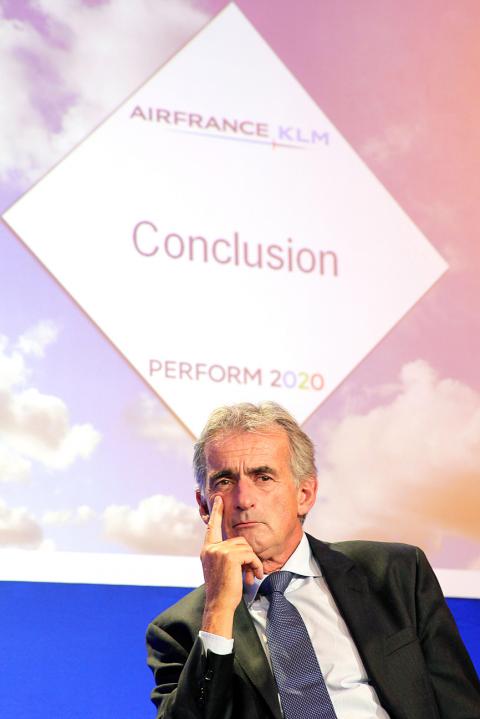Air France is to only operate 40 percent of its flights from today as pilots begin a one-week strike over company plans to cut costs aimed at recapturing market share from budget airlines, the airline said in a statement on Saturday.
Speaking to France Inter radio earlier on Saturday, Air France chief executive officer Frederic Gagey repeated that the strike, which could run until Monday next week, would cost the airline between 10 million and 15 million euros a day (US$10.3 million to US$10.9 million).
Europe’s second-largest traditional carrier by revenue said early this month it would move ahead with a plan to open new bases in Europe under the Transavia brand to recapture market share from low-cost carriers and rivals based in the Middle East.

Photo: Bloomberg
“Air France forecasts it can guarantee 40 percent of its flights for Sept. 15 given the number of pilots on strike on that day is estimated at 60 percent,” the airline said.
Air France, which issued a profit warning in recent months, is hampered by powerful unions in their efforts to lower costs. The main pilots’ unions have called for strikes from today through Monday next week.
The airline said it is open to negotiations on benefits tied to seniority and incentives for Air France pilots who transfer to Transavia, but would not yield to trade unions demanding that the labor contracts of Transavia pilots carry the same terms as those flying under the Air France brand.
“The passengers will be informed and we ask them, if possible, to change their tickets to avoid this period which is a little uncertain,” Gagey told France Inter.

On Tuesday, US President Donald Trump weighed in on a pressing national issue: The rebranding of a restaurant chain. Last week, Cracker Barrel, a Tennessee company whose nationwide locations lean heavily on a cozy, old-timey aesthetic — “rocking chairs on the porch, a warm fire in the hearth, peg games on the table” — announced it was updating its logo. Uncle Herschel, the man who once appeared next to the letters with a barrel, was gone. It sparked ire on the right, with Donald Trump Jr leading a charge against the rebranding: “WTF is wrong with Cracker Barrel?!” Later, Trump Sr weighed

HEADWINDS: Upfront investment is unavoidable in the merger, but cost savings would materialize over time, TS Financial Holding Co president Welch Lin said TS Financial Holding Co (台新新光金控) said it would take about two years before the benefits of its merger with Shin Kong Financial Holding Co (新光金控) become evident, as the group prioritizes the consolidation of its major subsidiaries. “The group’s priority is to complete the consolidation of different subsidiaries,” Welch Lin (林維俊), president of the nation’s fourth-largest financial conglomerate by assets, told reporters during its first earnings briefing since the merger took effect on July 24. The asset management units are scheduled to merge in November, followed by life insurance in January next year and securities operations in April, Lin said. Banking integration,

LOOPHOLES: The move is to end a break that was aiding foreign producers without any similar benefit for US manufacturers, the US Department of Commerce said US President Donald Trump’s administration would make it harder for Samsung Electronics Co and SK Hynix Inc to ship critical equipment to their chipmaking operations in China, dealing a potential blow to the companies’ production in the world’s largest semiconductor market. The US Department of Commerce in a notice published on Friday said that it was revoking waivers for Samsung and SK Hynix to use US technologies in their Chinese operations. The companies had been operating in China under regulations that allow them to import chipmaking equipment without applying for a new license each time. The move would revise what is known

Artificial intelligence (AI) chip designer Cambricon Technologies Corp (寒武紀科技) plunged almost 9 percent after warning investors about a doubling in its share price over just a month, a record gain that helped fuel a US$1 trillion Chinese market rally. Cambricon triggered the selloff with a Thursday filing in which it dispelled talk about nonexistent products in the pipeline, reminded investors it labors under US sanctions, and stressed the difficulties of ascending the technology ladder. The Shanghai-listed company’s stock dived by the most since April in early yesterday trading, while the market stood largely unchanged. The litany of warnings underscores growing scrutiny of